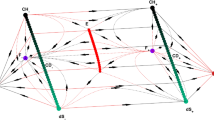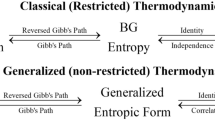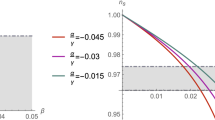Abstract
If the Universe is closed and began with low entropy, it began without an initial singularity in an unstable de Sitter phase. Because of the irreversible nature of the processes, when this closed Universe ultimately contracts it will not bounce, but will go into a ‘final crunch’. In this final reheating, symmetry will be restored, but the contraction will never become deflationary. A closed Universe therefore lives only once, and can start with a whimper, but goes out with a bang.
This is a preview of subscription content, access via your institution
Access options
Subscribe to this journal
Receive 51 print issues and online access
$199.00 per year
only $3.90 per issue
Buy this article
- Purchase on Springer Link
- Instant access to full article PDF
Prices may be subject to local taxes which are calculated during checkout
Similar content being viewed by others
References
Guth, A. H. & Sher, M. Nature 302, 505 (1983).
Petrosian, V. Nature 302, 506 (1983).
Landau, L. D. & Lifshitz, L. M. Statistical Physics, 41, 262 (Pergamon, London, 1958).
Bludman, S. A. Proc. IAU Symp. No. 104, 447–451 (1983).
McCrea, W. H. & Milne, E. A. Q. Jl Math. 5, 73 (1934).
Milne, E. A. Q. Jl Math. 5, 64 (1934).
Einstein, A. in Albert Einstein Philosopher-Scientist (ed. Schelp, P. A.) 31 (Tudor, New York, 1949).
Barrow, J. D. & Tipler, F. J. Nature 276, 453 (1978).
Fang, L. Z., Kiang, T., Cheng, F. H. & Hu, F. X. Q. Jl. R. astr. Soc. 23, 363 (1982).
Hoessel, J. G., Gunn, J. E. & Thuan, T. X. Astrophys. J. 241, 486 (1980).
Davis, M. & Peebles, P. J. E. A. Rev. Astr. Astrophys. 21, 109 (1983).
Press, W. H. & Davis, M. Astrophys. J. 259, 449 (1981).
Sandage, A. R. Astr. J. 88, 1159 (1983).
Iben, I. & Renzini, A. Phys. Rep. (in the press).
Thielemann, F.-K., Metzinger, J. & Klapdor, H. V. Astr. Astrophys. 123, 162 (1983).
de Vaucouleurs, G., Peters, W.L., Bottinelli, L., Gauguenheim, L. & Paturel, G. Astrophys. J. 248, 408, 86–B3 (1981).
Aaronson, M. et al. Astrophys. J. 239, 12 (1980).
Aaronson, M. & Mould, J. Astrophys. J. 265, 1 (1983).
Sandage, A. R. & Tammann, G. A. Astrophys. J. 256, 339 (1982).
Guth, A. H. Phys. Rev. D23, 347 (1981).
Davies, P. C. W. Nature 301, 398 (1983).
Hoessel, J. G. Astrophys. J. 241, 493 (1980).
Author information
Authors and Affiliations
Rights and permissions
About this article
Cite this article
Bludman, S. Thermodynamics and the end of a closed Universe. Nature 308, 319–322 (1984). https://doi.org/10.1038/308319a0
Received:
Accepted:
Issue Date:
DOI: https://doi.org/10.1038/308319a0
This article is cited by
-
Statistical Mechanical Theory of a Closed Oscillating Universe
Foundations of Physics (2010)
-
Consistency of the pulsating universe with Einstein’s field equations
Il Nuovo Cimento B (1993)
Comments
By submitting a comment you agree to abide by our Terms and Community Guidelines. If you find something abusive or that does not comply with our terms or guidelines please flag it as inappropriate.



